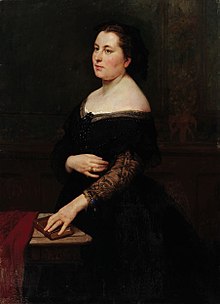widower

A widower (Wwr.) Or a widow (Wwe.) Is a surviving person whose spouse has died.
Widow or Witib (outdated, in Austria also Wittib ) or widow (Swiss, otherwise out of date) denotes women who have lost their spouse; Widower or Witmann (Swiss, otherwise out of date) men who have lost their spouse.
In addition to being single, married and divorced, widowed is one of the four common family statuses worldwide . In a broader sense, the term also refers legally to same-sex marriages or registered partnerships , but not to other unions .
Demographics
The number of widows is higher than that of widowers. This is due to the higher life expectancy of women and the age difference at marriage (women are usually younger than their men).
In times of war, the number of widows relative to widowers increases as long as the war is not concentrated on the home population and as long as the burden of participation in combat operations is not evenly distributed between soldiers.
Social position
That widows a "good match" are, was literary in the example Merry Widow by Franz Lehár added: The rich lady is swarmed hot and knows how to use her widow's life to live after the death of her husband in greater and financial freedom.
In fact, most widows (and widowers) will have a harder time in reality. Caring for widows and orphans is an important issue in the history of welfare and later the welfare state, especially after wars that left many “war widows ” behind.
In addition, especially in pre-industrial societies, there is the lower social status of a widow, especially if she is childless. In extreme cases, the life of a widow is considered worthless, which is expressed in customs such as widow burning (sati) , which is still occasionally practiced illegally in India today.
In strictly patrilineal societies, the custom of marriage -in-law still exists today , where a brother of the deceased marries his widow in order to continue his line.
Legal situation in Germany
In Germany, the surviving life partner of a registered civil partnership is also commonly referred to as a widow. Legal equality with widows / widowers in terms of survivors' benefits was introduced in the statutory pension scheme at the beginning of 2005, it has been implemented for civil servants in recent years and it is still pending for members of the liberal professions.
A survivor's pension will not be paid if the marriage took place within one year before the death of the deceased, unless the specific circumstances of the individual case justify the assumption that it was not the sole or predominant purpose of the marriage to entitle a survivor to benefits justify (so-called supply marriage ).
literature
- Britta-Juliane Kruse: widows. Cultural history of a class in the late Middle Ages and early modern times. De Gruyter, Berlin et al. 2007, ISBN 978-3-11-018926-1 (also: Berlin, Freie Univ., Habil.-Schr., 2005).
- Gesa Ingendahl: Widows in the Early Modern Age. A cultural-historical study (= history and gender. Vol. 54). Campus-Verlag, Frankfurt am Main et al. 2006, ISBN 3-593-38171-0 (at the same time: Jena, Univ., Diss., 2004-2005: Die Wittib ).
- Martina Schattkowsky (Ed.): Widowhood in the early modern times. Princely and noble widows between foreign and self-determination (= writings on Saxon history and folklore. Vol. 6). Leipziger Universitäts-Verlag, Leipzig 2003, ISBN 3-936522-79-0 .
